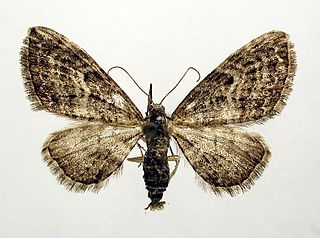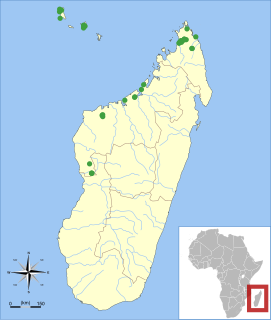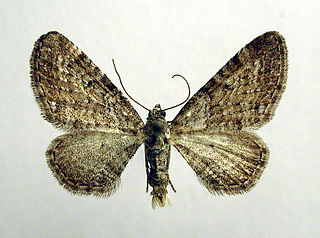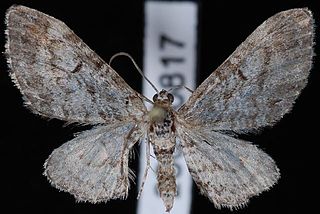
Eupithecia is a large genus of moths of the family Geometridae. There are hundreds of described species, found in all parts of the world, and new species are discovered on a regular basis.

The lime-speck pug is a moth of the family Geometridae. It is a common species throughout the Palearctic region, the Near East and North Africa.

The common pug(Eupithecia vulgata) is a moth of the family Geometridae. It is a common species across the Palearctic region, the Near East and North Africa. It ranges from the Atlantic coast of Ireland and Portugal across Europe, the Middle East and Central Asia to the Russian Far East (Priamurje) and Korea.

The juniper pug or juniper looper is a moth of the family Geometridae. The species was first described by Michael Denis and Ignaz Schiffermüller in 1775. It is found throughout the Palearctic and Nearctic regions and the Near East.

The Manavi long-fingered bat is a bat in the genus Miniopterus that occurs in east-central Madagascar. First described in 1906, this species was later included in the mainland African M. minor. A 1995 revision united populations of small Miniopterus from Madagascar and the Comoros as M. manavi, but molecular and morphological studies in 2008 and 2009 showed that this concept of M. manavi in fact included five different species. M. manavi itself was restricted to a few locations in the eastern Central Highlands and populations in the Comoros and northern and western Madagascar were allocated to different species.

Eupithecia innotata, the angle-barred pug, is a moth of the family Geometridae. The species was first described by Johann Siegfried Hufnagel in 1767. It ranges from Spain in the west to western Siberia and Central Asia in the east.

The larch pug is a moth of the family Geometridae. The species can be found in Europe, the Ural Mountains, West and Central Siberia, the Altai Mountains, Transbaikalia, Yakutia, the Far East, Mongolia, Korea, Japan and in North America, from Yukon and Newfoundland to New York and Arizona.

Eupithecia simpliciata, the plain pug, is a moth of the family Geometridae. It is found in the Palearctic ecozone, from western Europe to north-western China (Xinjiang).

Pingasa is a genus of moths in the family Geometridae first described by Moore in 1887.

Eupithecia venosata, the netted pug, is a moth of the family Geometridae. It was first described by Johan Christian Fabricius in 1787. It is found across the Palearctic ecozone from Portugal and Morocco in the west to the Lake Baikal in Siberia and Afghanistan and Pakistan in the east.

Miniopterus aelleni is a bat in the genus Miniopterus that occurs on Anjouan in the Comoros and in northern and western Madagascar.

Miniopterus griveaudi is a bat in the genus Miniopterus found on Grande Comore and Anjouan in the Comoros and in northern and western Madagascar. First described in 1959 from Grande Comore as a subspecies of the mainland African M. minor, it was later placed with the Malagasy M. manavi. However, morphological and molecular studies published in 2008 and 2009 indicated that M. manavi as then defined contained five distinct, unrelated species, and M. griveaudi was redefined as a species occurring on both Madagascar and the Comoros.

Eupithecia pernotata, or Guenée's pug, is a moth of the family Geometridae. The species was first described by Achille Guenée in 1857. It is known from the Alps, through Romania to southern Russia. It is also found in Finland.

Brookesia griveaudi, commonly known as the Marojejy leaf chameleon, is a species of chameleon, a lizard in the family Chamaeleonidae. The species is endemic to northeastern Madagascar. It was described as a species new to science by Brygoo, Blanc, and Domergue in 1974. It is listed as Near Threatened by the International Union for Conservation of Nature.
Pingasa griveaudi is a moth of the family Geometridae first described by Claude Herbulot in 1966. It is found on the Comoros.

Eupithecia quadripunctata is a moth in the family Geometridae. It is found in India, Pakistan, Nepal, Russia, China, Taiwan, Korea, Japan and northern Thailand.
Eupithecia variostrigata is a moth in the family Geometridae. It is widespread in the western Palaearctic, ranging from Spain to the western Pamirs in the east.

Eupithecia graefi, or Graef's pug, is a moth in the family Geometridae. The species was first described by George Duryea Hulst in 1896. It is found in North America from south-western Alberta west to Vancouver Island, north to Alaska and south to California. The habitat consists of wooded areas.
















